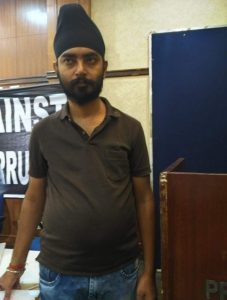Healthcare corruption: Struggle for justice
As medical negligence in private hospitals continues to claim lives, affected families raise the need for regulation, and demand a separate body for medical negligence cases even as they highlight government apathy.
 A dya Singh, a seven-year-old girl, lost her life to dengue at one of Gurgaon’s premier hospitals. The hospital then handed a bill of Rs 15.5 lakh to the parents of Adya. A government inquiry said that the death happened due to Fortis’ “negligence, unethical and unlawful acts” and that it made 108 per cent profit on medicines administered to the child, meaning that the hospital deliberately used expensive medicines with “injudicious use of consumables” like gloves and syringes.
A dya Singh, a seven-year-old girl, lost her life to dengue at one of Gurgaon’s premier hospitals. The hospital then handed a bill of Rs 15.5 lakh to the parents of Adya. A government inquiry said that the death happened due to Fortis’ “negligence, unethical and unlawful acts” and that it made 108 per cent profit on medicines administered to the child, meaning that the hospital deliberately used expensive medicines with “injudicious use of consumables” like gloves and syringes.
“A year since, her father, Jayant Singh, has been fighting the systematic corruption in healthcare through CDAH – The Campaign for Dignified and Affordable Healthcare, an informal forum of patients and families, health experts and civil society groups.”
“Over the last year, stories have come out in the media highlighting the plight of families helpless in the face of exploitation, fleecing and callous treatment by private hospitals. In spite of overwhelming evidence, the Government has turned a blind eye to the crisis in accessing health services through the private sector and not taken any steps towards regulating it,” said Jayant, addressing media persons recently.
Despite an FIR being filed on December 9, 2017, and an SIT formed, the chargesheet has not been filed even after 10 months. “I have submitted multiple letters to the commissioner, DCP, ACP and IO regarding the chargesheet and everytime I get the same response of ‘1-2 week me kardenge’. However, those 1-2 weeks seem to be missing from the calendar,” he said, showing boxes of more than 800 letters to be submitted this time, to Rajya Sabha and Lok Sabha MPs, raising concerns of widespread medical and healthcare corruption and need for regulation of the private healthcare sector.
“The objective is to create awareness to bring people together and at least awaken the government authorities. We need to nationalise all the private healthcare bodies. Why can’t we do that? It is the government’s responsibility,” Jayant, an IT professional working in Gurgaon, told Delhi Post.

He alleged that the nexus between private hospitals, government bodies and pharmaceutical companies is not letting the medical system function leading to widespread corruptive practices. He told Delhi Post, “In my writ petition in the Supreme Court, I talk about the nexus between pharmaceutical companies and medical devices of the hospitals and government authorities. I asked for a replacement to the Medical Council of India because it is not doing what it should be. I have asked for a separate body to deal with medical negligence cases. The system needs to be regulated.”
Rinku Singh, son of late Sardar Pradhan Singh, a resident of UP’s Azamgarh, is forced to come to Delhi every time a court date comes. It has been more than seven times that he has visited Delhi for the past two and a half years. He is fighting a legal battle in the consumer court as well as in a case brought by Max Hospital, Saket against him for unpaid bills. “My father was advised for a kidney transplant and was admitted in the hospital. But there were several violations such as doctors neglected his infection levels and high sugar levels, blood report of some other patient was found in file, and immunosuppressive injections, (Rs 16,500 each) that were to be administered before transplant, were never given,” he recalled.
“Action against doctors is necessary so that other doctors fear before indulging in such malpractices. Unless there is action, there won’t be adequate reaction,” he told Delhi Post.
Rinku, a business person by profession, also said that the government doesn’t want to act because “they don’t want private hospitals to be controlled because control would mean that they would have to increase their capacity and facilities. They are after all dependent on the private sector”.
Similar stories of loss, struggle and medical apathy were shared. From administering wrong drugs, expensive devices and drugs to lack of quality care, the affected family members underlined the systematic failure and nexus between private institutions, government bodies and pharmaceutical companies.
Rajiv Nath, President, AiSNMA – All India Syringes and Needle Manufacturers Association, told Delhi Post, “Patients are also consumers. The basis of the procurement of medical device should be on the basis of the cost and quality of the product, not on the basis of MRP of the product. If a higher MRP product is going to be used to inflate the costs to meet packages needs, then that is going to be distortion of the system.”
He further added that help from the Government is needed to “discipline” the 4 manufacturers BD, BBraun, Nipro and Lifelong who are unwilling to self-regulate and continue to sell to hospitals with MRPs that are 3-4 times more than theirs. “We are finding it difficult to extend self-regulations to other products without government assistance and willingness to regulate the market place so that hospitals focus on cost minimisation and not profit maximisation,” said Rajiv.
Absence of regulatory framework and a virtually free-for-all situation has been the “modus operandi” of the private healthcare which the affected family members said is detrimental considering that the situation is not just in metros but in tier-I and tier-II cities as well.
On the other hand a lot of incentives and subsidies “are being provided to allow private sector to grow through state-funded insurance schemes”. The soon to be launched Ayushman Bharat is one such case in point, said Dr. Indranil Mukhopadhyay, a health activist with the Jan Swasthya Abhiyan.
From millions of fragmented small providers, the for-profit private sector is “getting organised into hospital chains” with large MNCs and Indian chains taking over smaller nursing homes.
“Dr. Indranil held that investments are flowing from the financial sector, angel investments and other forms of hot money flow. Thus there is always higher pressure for profit, with the danger of oligopoly also looming.”
“Though state-sponsored insurance is an assurance of steady markets for the booming healthcare business, a large part of the market would be without any price regulation and hence subject to all sorts of distortion that we are seeing in smaller scale. This also sets up conditions for expansion of private market, which operates without much regulation,” he said.
